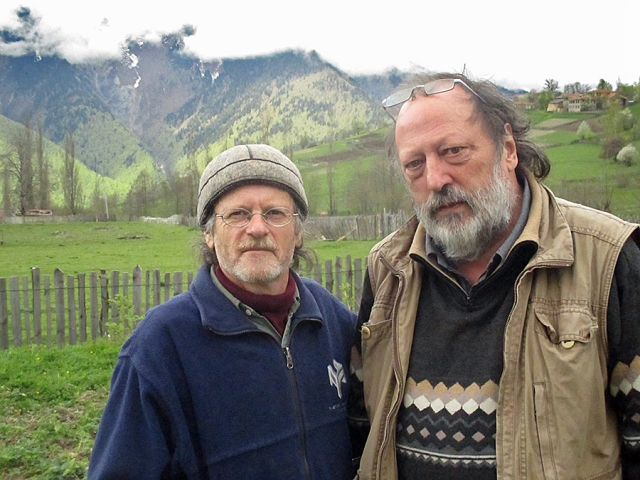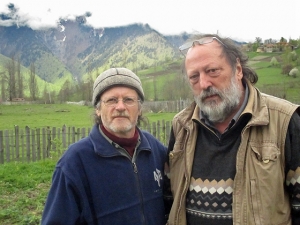Interview with Rainer Kaufmann: Etseri, Svaneti
Mr Kaufmann was the driver for a family of three other Germans visiting our guest house a short while ago. He has been in Georgia since its end days as a Soviet state, and I was glad for the chance to get to know him a bit better during his stay. One anecdote he offered was that the same now-deceased Svans who had protected me during my early visits to Svaneti, in the lawless pre-Saakashvili years, had tried many times (without success) to rob him as he passed through Etseri!
Q: Please tell us a bit about yourself—where you are from; when, how and why you first got interested in Georgia, how you first visited.
A: I’m a German TV journalist. During New Year 1989/1990 I accompanied a pupil exchange from my hometown with Tbilisi 6th school, the then so-called “German School”. It was during the Soviet time and very impressive, especially because almost nobody believed in the future of the communist system. A country on its way to independence and freedom.
Q: What made you stay? What are you doing here now?
A: I didn’t decide, in those years, to stay permanently. But as a freelance journalist I’ve had enough time and—of course—curiosity, to explore this country in the years following that first visit. The first idea I considered was to organize cultural tourism from Germany, only to help German teachers in Tbilisi during their summers to earn some money. We started with tourist groups from Germany in 1993. The rest of the story is very simple. As there was no hotel in Tbilisi, private home-stays only, my wife and I invested in a little guesthouse there. As the business grew, the guesthouse had to expand. The ex-pats in Tbilisi were asking for a European restaurant. “Rainer, do you have pizza and bratwurst?” So 15 years ago I brought the first pizza oven to Tbilisi, and with that, the beer garden and pizzeria was established. And so on and so on.
During this time I’ve produced some 15 documentaries for German TV channels in Georgia, the first in 1994-95 in Svaneti. I have written two books, and published a photo-book about Georgia. And for the last three years I’ve been the editor of the traditional German Newspaper in Georgia “Kaukasische Post—founded 1906”. All of this happened by chance.
Q: What are some of your fondest memories of your time in Georgia?
A: Too much for me to choose from! For me, Georgia is a place that can take a lot from you, sometimes it takes too much from you, but it gives you all.
Q: What was the greatest surprise for you here?
A: The possibility to realize your ideas without regulations anywhere. Germany is over-regulated in each field of life. OK, Georgia is somehow under-regulated. But what’s the better way? I really don’t know. Or do I? By the way: The greatest surprise for me is that, even after 25 years, this country is able to surprise me every day.
Q: How has Georgia changed you?
A: We Germans are world champions in organization, Georgians “only vice-champions” in this field. But they are world-champions in improvisation. Even if I have tried hard to train my staff in organization, I’ve learned a lot from them in dealing in a more relaxed way with all the daily problems. There is always a solution, even some minutes after midnight!
Q: How would you describe your native country’s relationship with Georgia?
A: A difficult question, because there are many approaches in Germany to Georgia, while the Georgian approach to Germany is clear: Germans are good, whatever they mean by those words. We in Germany have a lot to learn about Georgia; Georgia is widely an unknown and most of my compatriots even fear travelling here. “Isn’t it dangerous?”—the question I must answer constantly. But we should not forget that it is Georgia with its revolutions, civil wars and other bad events, which has contributed to this image. So there’s a lot to do to inform Germans about the reality here.
Q: What is your opinion of the EU/Georgia relationship, as it is or should be?
A: First of all: Georgia is at the edge of Europe but definitely part of it. And Georgia has the right to be considered part of Europe. I cannot understand how the EU is monopolizing the word “Europe” for its own interests. If you stand at the eastern EU border in Poland, the distance to the Atlantic in Portugal is nearly the same as to the Urals. So: east of the EU there is the other half of Europe. Coming to the Georgian dream of Europe, I fear that there is a huge misunderstanding between the EU and Georgia, including the countries of the so called Eastern Partnership. Georgia considers the Association Agreement as the first step towards gaining— in the near future—full membership of the EU. It’s the right of Georgia to demand this goal. But I fear that for Brussels this agreement has been designed as the first step, to avoid full membership. To avoid huge disappointment in the society of Georgia, isn’t it high time to tell the truth? But we continue to exchange diplomatic set phrases. The latest opinion polls in Georgia should be seriously considered in Brussels. If the EU is only demanding implementation of its standards, if during the next years the EU will produce only hardships for the majority of the poor population and nearly no benefits, than public opinion regarding the EU could be under serious risk. I would recommend all EU bureaucrats and politicians to come to Georgia, but not only to teach Georgians what they have to do; I wish them first of all to come to listen, to learn the reality of the population and also to learn from Georgia.
Q: What one or two things would you most like to see changed in Georgia as it is now?
I wish this country would find its own way at the crossroads of the worlds; the crossroads of east and west, north and south. This location has created the country’s unique charm over centuries. Despite all the needed progress and changes in society, in the economy and politics, Georgia will no longer be the country I’ve discovered if it’s not able to preserve this, its own character.
My websites: www.erkareisen.de (German); www.hotel-kartli.com (German, English); www.kaukasische-post.de (German); www.erka-verlag.de (German)
Tony Hanmer runs the “Svaneti Renaissance” Facebook group, now with over 1000 members, at
www.facebook.com/groups/SvanetiRenaissance/ .
He and his wife also run their own guest house in Etseri:
www.facebook.com/hanmer.house.svaneti
Tony Hanmer












